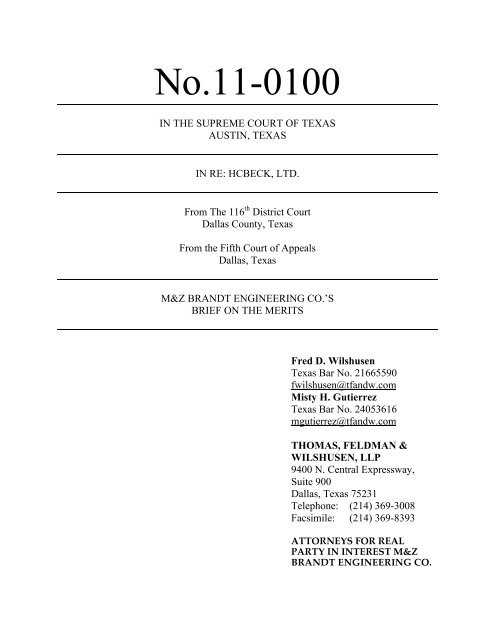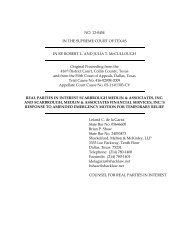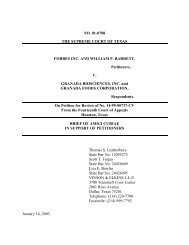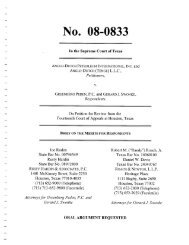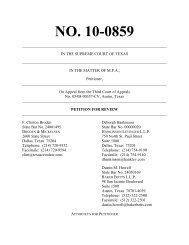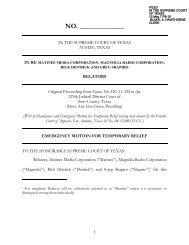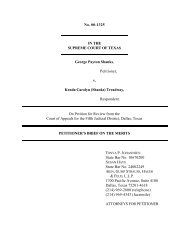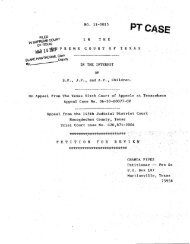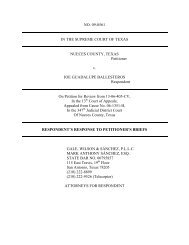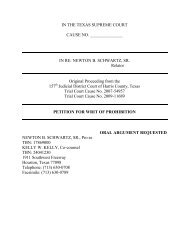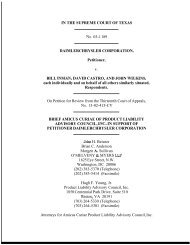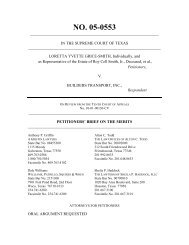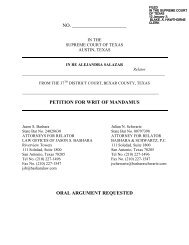DRAFT 2 Brief on the merits - Supreme Court of Texas
DRAFT 2 Brief on the merits - Supreme Court of Texas
DRAFT 2 Brief on the merits - Supreme Court of Texas
You also want an ePaper? Increase the reach of your titles
YUMPU automatically turns print PDFs into web optimized ePapers that Google loves.
No.11-0100<br />
IN THE SUPREME COURT OF TEXAS<br />
AUSTIN, TEXAS<br />
IN RE: HCBECK, LTD.<br />
From The 116 th District <strong>Court</strong><br />
Dallas County, <strong>Texas</strong><br />
From <strong>the</strong> Fifth <strong>Court</strong> <strong>of</strong> Appeals<br />
Dallas, <strong>Texas</strong><br />
M&Z BRANDT ENGINEERING CO.’S<br />
BRIEF ON THE MERITS<br />
Fred D. Wilshusen<br />
<strong>Texas</strong> Bar No. 21665590<br />
fwilshusen@tfandw.com<br />
Misty H. Gutierrez<br />
<strong>Texas</strong> Bar No. 24053616<br />
mgutierrez@tfandw.com<br />
THOMAS, FELDMAN &<br />
WILSHUSEN, LLP<br />
9400 N. Central Expressway,<br />
Suite 900<br />
Dallas, <strong>Texas</strong> 75231<br />
Teleph<strong>on</strong>e: (214) 369-3008<br />
Facsimile: (214) 369-8393<br />
ATTORNEYS FOR REAL<br />
PARTY IN INTEREST M&Z<br />
BRANDT ENGINEERING CO.
TABLE OF CONTENTS<br />
TABLE OF CONTENTS................................................................................................................. i<br />
TABLE OF AUTHORITIES .......................................................................................................... ii<br />
JOINDER AND ADOPTION OF PETITION AND BRIEF ON THE MERITS .......................... 1<br />
STATEMENT OF THE CASE....................................................................................................... 1<br />
ISSUES PRESENTED ................................................................................................................... 2<br />
1. When a plaintiff’s claims are compelled to arbitrati<strong>on</strong> and <strong>the</strong> plaintiff does nothing<br />
to initiate arbitrati<strong>on</strong> proceedings for more than four years after <strong>the</strong> trial court orders<br />
arbitrati<strong>on</strong>, has <strong>the</strong>re been a default in arbitrati<strong>on</strong> under Secti<strong>on</strong> 3 <strong>of</strong> <strong>the</strong> Federal<br />
Arbitrati<strong>on</strong> Act? .................................................................................................................. 2<br />
2. When a plaintiff has defaulted in arbitrati<strong>on</strong>, does a trial court violate <strong>the</strong> Federal<br />
Arbitrati<strong>on</strong> Act by granting <strong>the</strong> defaulting plaintiff’s request to return to arbitrati<strong>on</strong>?...... 2<br />
STATEMENT OF FACTS ............................................................................................................. 2<br />
ARGUMENT.................................................................................................................................. 3<br />
A. Heritage Waived Its Right to Arbitrate Because It Unreas<strong>on</strong>ably Delayed in Filing a Demand for<br />
Arbitrati<strong>on</strong> After <strong>the</strong> Trial <strong>Court</strong> Ordered <strong>the</strong> Parties to Arbitrate....................................................... 3<br />
1. Heritage’s Inacti<strong>on</strong> C<strong>on</strong>stitutes Default........................................................................................ 4<br />
2. This Questi<strong>on</strong> Cannot Be Decided By The Arbitrator When Arbitrati<strong>on</strong> was Never Initiated .... 6<br />
3. A Four-Year Delay in Initiating Arbitrati<strong>on</strong> is Prejudicial Per Se................................................ 8<br />
4. Heritage Had a Duty to Diligently Pursue Its Claims by Initiating Arbitrati<strong>on</strong> Proceedings Within<br />
a Reas<strong>on</strong>able Time ......................................................................................................................... 10<br />
5. The Purpose <strong>of</strong> Arbitrati<strong>on</strong> is Frustrated By a Four-Year Delay in Initiating Arbitrati<strong>on</strong> After<br />
Arbitrati<strong>on</strong> Was Compelled ........................................................................................................... 12<br />
B. Brandt was Prejudiced by Heritage's Delay.................................................................................... 13<br />
C. Heritage's Claims Must be Dismissed Because They Were Aband<strong>on</strong>ed ........................................ 15<br />
D. Mandamus is Appropriate Because <strong>the</strong> Trial <strong>Court</strong> had a Duty to Require Heritage to Prosecute its<br />
Suit With Diligence......................................................................................................................... 16<br />
Prayer ............................................................................................................................................ 17<br />
Certificati<strong>on</strong> .................................................................................................................................. 18<br />
i
!"#$#!<br />
TABLE OF AUTHORITIES<br />
3V, Inc v. JTS Enterprises, Inc., 40 S.W.3d 533, 540 (Tex. App.—Houst<strong>on</strong> 2000, no pet.) "##$!#%$!<br />
#&!<br />
EZ Pawn"""""""""""""""""""""""""""""""""""""""""""""""""""""""""""""""""""""""""""""""""""""""""""""""""""""""""""""""""""""""""""""""""""""""""""""""""""""""""""""""""""""""""&!<br />
Futurewei Techs. Inc. v. E. Oliver Capital Group, LLC, No. 4:09CV455, 2011 U.S. Dist. LEXIS<br />
39080 at *4 (E.D.T.X. [Sherman Div.] April 11, 2011)(mem. op.) """"""""""""""""""""""""""""""""""""""""""" '$!%$!(!<br />
Futurewei Techs. Inc. v. E. Oliver Capital Group, LLC, No. 4:09CV455, 2011 U.S. Dist. LEXIS<br />
53826 (E.D.T.X. [Sherman Div.] May 19, 2011)(mem. op.)""""""""""""""""""""""""""""""""""""""""""""""""""""""""""""""""""'!<br />
Garcia v. Mas<strong>on</strong> C<strong>on</strong>tract Products, LLC, No. 08-23103-Civ-Torres, 2010 U.S. Dist. 92869<br />
(S.D.F.L., August 18, 2010)""""""""""""""""""""""""""""""""""""""""""""""""""""""""""""""""""""""""""""""""""""""""""""""""""""""""""""""""""""""""""($!)!<br />
Glass v. Kidder Peabody & Co., Inc"""""""""""""""""""""""""""""""""""""""""""""""""""""""""""""""""""""""""""""""""""""""""""""""""""""""""""""""""""")!<br />
Howsam v. Dean Witter Reynolds, 537 U.S. 79, 84-86 (2002)"""""""""""""""""""""""""""""""""""""""""""""""""""""""""""""""""""(!<br />
Id!%!<br />
In re Bruce Terminix Co., 988 S.W.2d 702, 705-706 (Tex. 1998) """"""""""""""""""""""""""""""""""""""""""""""""""""""""""""*!<br />
Legg, Mas<strong>on</strong> & Co. v. Mackall & Coe, Inc., 351 F. Supp. 1367, 1372 (D.D.C. 1972) """""""""""""""""""##!<br />
Lessard v. Velsicol, No. 13-00-00113-CV, 2009 Tex. App. LEXIS 2811 (Tex. App.—Corpus<br />
Christi, April 23, 2009, pet. denied)"""""""""""""""""""""""""""""""""""""""""""""""""""""""""""""""""""""""""""""""""""""""""""""""""""""""""""""#%!<br />
Lowe v. United States Shoe Corp., 849 S.W.2d 888, 891 (Tex. App.—Houst<strong>on</strong> [14th Dist.] 1993,<br />
writ denied)"""""""""""""""""""""""""""""""""""""""""""""""""""""""""""""""""""""""""""""""""""""""""""""""""""""""""""""""""""""""""""""""""""""""""""""""""""""""""""#%!<br />
Mamlin v. Susan Thoman, Inc., 490 S.W.2d 634 (Tex. Civ. App.—Dallas 1973, no writ) """""""""($!*!<br />
Miller v. AAACON Auto Transport, Inc., 545 F.2d 1019, 1020 (5 th Cir. 1977)""""""""""""""""""""""""""""""""%$!(!<br />
Owens-Corning Fiberglas Corp. v. United States, 419 F2d 439, 455 (Ct. Cl. 1969)"""""""""""""""""""""""#'!<br />
Perry Homes v. Cull, 258 S.W.3d 580, 597 (Tex. 2008) """""""""""""""""""""""""""""""""""""""""""""""""""""""""""""""($!#+$!#,!<br />
Prest<strong>on</strong> v. Ferrer, 552 U.S. 346, 128 S. Ct. 978, 169 L. Ed. 2d 917 (2008)"""""""""""""""""""""""""""""""""#,!<br />
Prudential Securities Inc. v. Marshall""""""""""""""""""""""""""""""""""""""""""""""""""""""""""""""""""""""""""""""""""""""""""""""""""""""""""""%$!&!<br />
Radiator Specialty Co. v. Cann<strong>on</strong> Mills, Inc., 97 F.2d 318, 319 (4th Cir. 1938)"""""""""""""""""""""""""""""""#,!<br />
REA Express v. Missouri Pac. R.R., 447 S.W.2d 721, 727 (Tex. Civ. App.—Houst<strong>on</strong> [14th Dist.]<br />
1969, writ ref’d n.r.e.) """""""""""""""""""""""""""""""""""""""""""""""""""""""""""""""""""""""""""""""""""""""""""""""""""""""""""""""""""""""""""""""""""""""##!<br />
Sabine Sungas, Ltd. v. Port <strong>of</strong> Port Arthur Navigati<strong>on</strong> District <strong>of</strong> Jeffers<strong>on</strong> County, <strong>Texas</strong>, NO.<br />
09-09-00331-CV, 2011 Tex. App. LEXIS 228 (Tex. App.—Beaum<strong>on</strong>t, January 13, 2011, no<br />
pet. h.)"""""""""""""""""""""""""""""""""""""""""""""""""""""""""""""""""""""""""""""""""""""""""""""""""""""""""""""""""""""""""""""""""""""""""""""""""""""""""""""""""""""#&!<br />
Solis v. Int’l Bank <strong>of</strong> Commerce, No. 13-06-699-CV, 2009 Tex. App. LEXIS 458, *4 (Tex.<br />
App.—Corpus Christi January 22, 2009, no pet.)"""""""""""""""""""""""""""""""""""""""""""""""""""""""""""""""""""""""""""""##$!#&!<br />
Spain v. Houst<strong>on</strong> Oilers, Inc., 593 S.W.2d 746, 748 (Tex. Civ. App.—Houst<strong>on</strong> [14 th Dist.] 1979,<br />
no writ)"""""""""""""""""""""""""""""""""""""""""""""""""""""""""""""""""""""""""""""""""""""""""""""""""""""""""""""""""""""""""""""""""""""""""""""""""""""""""""""""""&$!*!<br />
Sucrest Corporati<strong>on</strong> v. Chimo Shipping Limited, 236 F. Supp. 229, (D.C.N.Y. 1964)"""""""""""""""""""##!<br />
Tyco Int’l (U.S.) Ltd. v. Swartz (In re Tyco Int’l Ltd. Sec. Litig.), 422 F.3d 41, 47 n.5 (5 th Cir.<br />
2005) """""""""""""""""""""""""""""""""""""""""""""""""""""""""""""""""""""""""""""""""""""""""""""""""""""""""""""""""""""""""""""""""""""""""""""""""""""""""""""""""""""""#+!<br />
Youngs v. Haugh, No. 4:08-CV-528-Y, 2009 U.S. Dist. LEXIS 21853, at *9 (N.D.T.X. March<br />
18, 2009)""""""""""""""""""""""""""""""""""""""""""""""""""""""""""""""""""""""""""""""""""""""""""""""""""""""""""""""""""""""""""""""""""""""""""""""""""""""""""" ($!#+!<br />
ii
STATUTES<br />
9 U.S.C. § 3................................................................................................................................. 5, 8<br />
OTHER AUTHORITIES<br />
AMERICAN ARBITRATION ASSOCIATION, AAA ARBITRATION ROADMAP: A GUIDE TO AAA<br />
ARBITRATION ............................................................................................................................ 13<br />
Keisha Rutledge, Subc<strong>on</strong>tractors Building Recogniti<strong>on</strong> <strong>on</strong> <strong>the</strong> Job, Tampa Bay Bus. J. (Mar. 12,<br />
2001) ......................................................................................................................................... 14<br />
RULES<br />
TEX. R. CIV. P. 190........................................................................................................................ 12<br />
TEX. R. CIV. P. 196.2..................................................................................................................... 12<br />
TEX. R. CIV. P. 197.2..................................................................................................................... 12<br />
TEX. R. CIV. P. 198.2..................................................................................................................... 12<br />
TEX. R. CIV. P. 329b...................................................................................................................... 12<br />
TEX. R. APP. P. 35.1 ...................................................................................................................... 12<br />
TEX. R. APP. P. 37 ......................................................................................................................... 12<br />
TEX. R. APP. P. 38.6 ...................................................................................................................... 12<br />
TEX. R. APP. P. 55.7 ...................................................................................................................... 12<br />
TEX. R. CIV. P. 99(b) ..................................................................................................................... 12<br />
TEX. R. APP. P. 33.2(e).................................................................................................................. 12<br />
Tex. R. App. P. 9.7.......................................................................................................................... 1<br />
TEX. R. CIV. P. 165a...................................................................................................................... 11<br />
TEX. R. CIV. P. 165a(2) ................................................................................................................. 11<br />
TEX. R. CIV. P. 21a........................................................................................................................ 12<br />
TREATISES<br />
Overt<strong>on</strong> A. Currie, et al., C<strong>on</strong>structi<strong>on</strong> Subc<strong>on</strong>tracting: A Legal Guide For Industry<br />
Pr<strong>of</strong>essi<strong>on</strong>als § 1.1 (Smith, Currie & Hancock, ed., 1991)....................................................... 13<br />
Philip L. Bruner and Patrick J. O’C<strong>on</strong>nor, Jr., Bruner and O’C<strong>on</strong>nor <strong>on</strong> C<strong>on</strong>structi<strong>on</strong> Law<br />
(2002)........................................................................................................................................ 13<br />
iii
TO THE HONORABLE SUPREME COURT OF TEXAS:<br />
JOINDER AND ADOPTION OF PETITION AND BRIEF ON THE MERITS<br />
Real Party in Interest M&Z Brandt Engineering Co. (“Brandt”) hereby joins in and<br />
adopts by reference <strong>the</strong> Petiti<strong>on</strong> for Writ <strong>of</strong> Mandamus and accompanying appendix and<br />
record filed by Relator HCBeck, Ltd. ("Beck") in this proceeding. Brandt fur<strong>the</strong>r fully<br />
adopts and incorporates herein Brandt’s Resp<strong>on</strong>se to Petiti<strong>on</strong> for Writ <strong>of</strong> Mandamus and<br />
Beck’s <str<strong>on</strong>g>Brief</str<strong>on</strong>g> <strong>on</strong> <strong>the</strong> Merits and <strong>the</strong>ir accompanying appendices. See Tex. R. App. P. 9.7<br />
(allowing any party to join in or adopt by reference all or part <strong>of</strong> a brief, petiti<strong>on</strong>,<br />
resp<strong>on</strong>se, moti<strong>on</strong>, or o<strong>the</strong>r document filed by ano<strong>the</strong>r party in <strong>the</strong> same case). For <strong>the</strong><br />
reas<strong>on</strong>s stated in <strong>the</strong> above-referenced documents and herein, <strong>the</strong> trial court abused its<br />
discreti<strong>on</strong> and exceeded its authority by improperly returning <strong>the</strong> case to arbitrati<strong>on</strong>.<br />
STATEMENT OF THE CASE<br />
When a plaintiff does not initiate arbitrati<strong>on</strong> proceedings for over four years after<br />
being ordered to arbitrate, does a trial court violate <strong>the</strong> Federal Arbitrati<strong>on</strong> Act by<br />
returning <strong>the</strong> case to arbitrati<strong>on</strong> at <strong>the</strong> defaulting plaintiff’s request?<br />
Resp<strong>on</strong>dent:<br />
Nature <strong>of</strong> <strong>the</strong> Case:<br />
H<strong>on</strong>orable Bruce Priddy, Judge <strong>of</strong> <strong>the</strong> 116 th District <strong>Court</strong>,<br />
Dallas County, <strong>Texas</strong><br />
Real Party in Interest, Heritage Hotels Rockport, LLC f/k/a<br />
Heritage Hotels Rockport, LP (“Heritage”) sued Relator,<br />
Beck, asserting c<strong>on</strong>structi<strong>on</strong> defect claims. The claims were<br />
compelled to arbitrati<strong>on</strong>. Heritage did not initiate arbitrati<strong>on</strong>.<br />
Beck <strong>the</strong>n filed <strong>the</strong> underlying declaratory judgment<br />
proceeding wherein Beck named Real Party in Interest<br />
Brandt, am<strong>on</strong>g o<strong>the</strong>rs, as a defendant in <strong>the</strong> underlying<br />
lawsuit. Brandt was a subc<strong>on</strong>tractor to Beck for <strong>the</strong><br />
c<strong>on</strong>structi<strong>on</strong> project at issue.<br />
1
Resp<strong>on</strong>dent’s Acti<strong>on</strong>:<br />
Proceedings in <strong>the</strong><br />
<strong>Court</strong> <strong>of</strong> Appeals:<br />
Heritage resp<strong>on</strong>ded to Beck’s declaratory judgment acti<strong>on</strong> by<br />
urging <strong>the</strong> trial court to return <strong>the</strong> parties’ dispute to<br />
arbitrati<strong>on</strong>. (R. Tab 1). Resp<strong>on</strong>dent granted Heritage’s<br />
moti<strong>on</strong> and ordered <strong>the</strong> case to arbitrati<strong>on</strong>. (Beck Petiti<strong>on</strong><br />
Apx. Tab 1).<br />
Beck filed a petiti<strong>on</strong> for writ <strong>of</strong> mandamus in <strong>the</strong> Fifth <strong>Court</strong><br />
<strong>of</strong> Appeals <strong>on</strong> January 5, 2011 (Cause No. 05-11-0005-CV).<br />
The petiti<strong>on</strong> was c<strong>on</strong>sidered by Justices Bridges, Richter and<br />
Murphy. Beck’s petiti<strong>on</strong> was denied <strong>on</strong> January 14, 2011.<br />
(Beck Petiti<strong>on</strong> Apx. Tab 2).<br />
ISSUES PRESENTED<br />
1. When a plaintiff’s claims are compelled to arbitrati<strong>on</strong> and <strong>the</strong> plaintiff does<br />
nothing to initiate arbitrati<strong>on</strong> proceedings for more than four years after <strong>the</strong><br />
trial court orders arbitrati<strong>on</strong>, has <strong>the</strong>re been a default in arbitrati<strong>on</strong> under<br />
Secti<strong>on</strong> 3 <strong>of</strong> <strong>the</strong> Federal Arbitrati<strong>on</strong> Act?<br />
2. When a plaintiff has defaulted in arbitrati<strong>on</strong>, does a trial court violate <strong>the</strong><br />
Federal Arbitrati<strong>on</strong> Act by granting <strong>the</strong> defaulting plaintiff’s request to<br />
return to arbitrati<strong>on</strong>?<br />
STATEMENT OF FACTS<br />
Heritage sued Beck in June 2005 alleging defective c<strong>on</strong>structi<strong>on</strong> <strong>of</strong> a hotel in<br />
Rockport, <strong>Texas</strong> (<strong>the</strong> “Project”). (R. Tab 2). Beck moved to compel arbitrati<strong>on</strong> <strong>of</strong><br />
Heritage’s claims. The trial court granted Beck’s moti<strong>on</strong> and stayed <strong>the</strong> pending lawsuit<br />
in February 2006. (R. Tab 3, p. 265-66). In January 2007, <strong>the</strong> trial court dismissed <strong>the</strong><br />
case and administratively closed its file. (R. Tab 1, p. 6; R. Tab 3, p. 275-77.) In March<br />
2010, Beck filed <strong>the</strong> underlying declaratory judgment acti<strong>on</strong> seeking declarati<strong>on</strong>s that (i)<br />
Heritage’s failure to initiate arbitrati<strong>on</strong> proceedings forfeited its right to arbitrate its<br />
2
claims, and (ii) Heritage’s claims were barred by limitati<strong>on</strong>s. (R. Tab 4).<br />
Beck was a general c<strong>on</strong>tractor and Brandt was <strong>on</strong>e <strong>of</strong> Beck’s subc<strong>on</strong>tractors who<br />
participated in <strong>the</strong> c<strong>on</strong>structi<strong>on</strong> <strong>of</strong> <strong>the</strong> Project. Beck named Brandt and o<strong>the</strong>r<br />
subc<strong>on</strong>tractors as defendants in <strong>the</strong> underlying declaratory judgment acti<strong>on</strong>. Beck has<br />
also attempted to join Brandt and o<strong>the</strong>r subc<strong>on</strong>tractors to <strong>the</strong> arbitrati<strong>on</strong> that is now<br />
proceeding simultaneously.<br />
In April 2010, over four years after <strong>the</strong> trial court first compelled arbitrati<strong>on</strong>,<br />
Heritage finally filed a demand for arbitrati<strong>on</strong> with <strong>the</strong> American Arbitrati<strong>on</strong> Associati<strong>on</strong><br />
(“AAA”). (R. Tab 3, p. 245) Heritage also resp<strong>on</strong>ded to Beck’s request for declaratory<br />
relief by asking <strong>the</strong> trial court to return <strong>the</strong> case to arbitrati<strong>on</strong>. (R. Tab 1). The trial court<br />
granted Heritage’s request, stayed <strong>the</strong> declaratory judgment acti<strong>on</strong>, and ordered <strong>the</strong><br />
parties’ dispute back to arbitrati<strong>on</strong>. (Beck Petiti<strong>on</strong> Apx. Tab 1). The Fifth <strong>Court</strong> <strong>of</strong><br />
Appeals denied Beck’s request for Mandamus relief from <strong>the</strong> trial court’s order. (Beck<br />
Petiti<strong>on</strong> Apx. Tab 2).<br />
ARGUMENT<br />
A. Heritage Waived Its Right to Arbitrate Because It Unreas<strong>on</strong>ably<br />
Delayed in Filing a Demand for Arbitrati<strong>on</strong> After <strong>the</strong> Trial <strong>Court</strong><br />
Ordered <strong>the</strong> Parties to Arbitrate<br />
Heritage mistakenly tries to equate this case with cases holding that <strong>the</strong>re is no<br />
waiver <strong>of</strong> arbitrati<strong>on</strong> based merely <strong>on</strong> <strong>the</strong> invocati<strong>on</strong> <strong>of</strong> judicial process. Indeed, <strong>the</strong>re are<br />
numerous cases discussing whe<strong>the</strong>r arbitrati<strong>on</strong> is waived based <strong>on</strong> how extensively a<br />
party has relied <strong>on</strong> <strong>the</strong> court system before moving to compel arbitrati<strong>on</strong>. But this case is<br />
3
not about <strong>the</strong> invocati<strong>on</strong> <strong>of</strong> judicial process before moving to compel arbitrati<strong>on</strong>—it is<br />
about a complete failure to initiate arbitrati<strong>on</strong> after a court has ordered <strong>the</strong> parties to<br />
arbitrate. The cases Heritage relies up<strong>on</strong> are not <strong>on</strong> point.<br />
A party can forfeit its right to arbitrate through ei<strong>the</strong>r acti<strong>on</strong> or inacti<strong>on</strong>. Futurewei<br />
Techs. Inc. v. E. Oliver Capital Group, LLC, No. 4:09CV455, 2011 U.S. Dist. LEXIS<br />
39080 at *4 (E.D.T.X. [Sherman Div.] April 11, 2011)(mem. op.). Cases discussing<br />
waiver based up<strong>on</strong> <strong>the</strong> invocati<strong>on</strong> <strong>of</strong> judicial processes pertain to forfeiture <strong>of</strong> <strong>the</strong> rights<br />
to arbitrate caused by acti<strong>on</strong>. C<strong>on</strong>versely, <strong>the</strong> present matter pertains to forfeiture <strong>of</strong> <strong>the</strong><br />
right to arbitrate caused by inacti<strong>on</strong>.<br />
Heritage did not forfeit its right to arbitrate because <strong>of</strong> its acti<strong>on</strong>s. It forfeited its<br />
right to arbitrate by doing nothing for four years.<br />
1. Heritage’s Inacti<strong>on</strong> C<strong>on</strong>stitutes Default<br />
The United States District <strong>Court</strong> for <strong>the</strong> Eastern District <strong>of</strong> <strong>Texas</strong> (Sherman<br />
Divisi<strong>on</strong>) recently c<strong>on</strong>sidered a matter similar to <strong>the</strong> <strong>on</strong>e presented herein.<br />
See<br />
Futurewei, 2011 U.S. Dist. LEXIS 39080. After <strong>the</strong> defendants, who had initially moved<br />
to compel arbitrati<strong>on</strong>, refused to arbitrate, <strong>the</strong> court found that “dilatory c<strong>on</strong>duct by<br />
Defendants c<strong>on</strong>stitutes a default in proceeding with <strong>the</strong> arbitrati<strong>on</strong> and warrants vacating<br />
<strong>the</strong> order staying <strong>the</strong> case and referring <strong>the</strong> matter to arbitrati<strong>on</strong>.” Id. at *6. The court<br />
vacated its order referring <strong>the</strong> case to arbitrati<strong>on</strong> and ultimately granted default judgments<br />
against <strong>the</strong> defendants. Id. at *8 and Futurewei Techs. Inc. v. E. Oliver Capital Group,<br />
LLC, No. 4:09CV455, 2011 U.S. Dist. LEXIS 53826 (E.D.T.X. [Sherman Div.] May 19,<br />
2011)(mem. op.). Because <strong>the</strong> defendants in Futurewei defaulted in arbitrati<strong>on</strong> under 9<br />
4
U.S.C. § 3, <strong>the</strong> court was not required to c<strong>on</strong>tinue <strong>the</strong> stay <strong>of</strong> <strong>the</strong> judicial proceedings in<br />
favor <strong>of</strong> arbitrati<strong>on</strong>. Futurewei, 2011 U.S. Dist. LEXIS 39080 at *4 and 6.<br />
Likewise, <strong>the</strong> lower court in <strong>the</strong> present case should have vacated <strong>the</strong> stay because<br />
Heritage defaulted. It is proper to vacate a stay when <strong>the</strong> progress <strong>of</strong> arbitrati<strong>on</strong> is<br />
hindered because “c<strong>on</strong>diti<strong>on</strong>s have so changed that it is no l<strong>on</strong>ger needed or is rendered<br />
inequitable.” Miller v. AAACON Auto Transport, Inc., 545 F.2d 1019, 1020 (5 th Cir.<br />
1977). It was not equitable to maintain <strong>the</strong> stay and require <strong>the</strong> parties to arbitrate after<br />
Heritage slept <strong>on</strong> its rights for four years.<br />
Fur<strong>the</strong>rmore, Heritage relies <strong>on</strong> cases in which <strong>the</strong>re was a delay in moving to<br />
compel arbitrati<strong>on</strong>. These cases are also distinguishable from <strong>the</strong> present matter. Here,<br />
<strong>the</strong>re was no delay in moving to compel arbitrati<strong>on</strong>. Heritage’s delay was in initiating<br />
arbitrati<strong>on</strong> proceedings after a court ordered <strong>the</strong> parties to arbitrate.<br />
Heritage relies heavily <strong>on</strong> Prudential Securities Inc. v. Marshall to support <strong>the</strong><br />
propositi<strong>on</strong> that a party does not waive <strong>the</strong> right to arbitrate merely by delay. 909 S.W.2d<br />
896, 899 (Tex. 1995). Heritage’s reliance <strong>on</strong> Prudential is misplaced.<br />
First, Prudential involves waiver based up<strong>on</strong> invocati<strong>on</strong> <strong>of</strong> judicial process. Id. at<br />
898. As discussed above, <strong>the</strong> present matter does not involve a waiver based up<strong>on</strong><br />
invocati<strong>on</strong> <strong>of</strong> <strong>the</strong> judicial process. Fur<strong>the</strong>rmore, in Prudential, <strong>the</strong> <strong>Court</strong> found that <strong>the</strong><br />
defendants “c<strong>on</strong>sistently and timely” sought to invoke <strong>the</strong>ir rights to arbitrati<strong>on</strong>. Id. at<br />
898. Only 18 m<strong>on</strong>ths passed from <strong>the</strong> time <strong>the</strong> cause <strong>of</strong> acti<strong>on</strong> accrued in April 1994 until<br />
<strong>the</strong> <strong>Supreme</strong> <strong>Court</strong> delivered its opini<strong>on</strong> in November 1995. Id. Certainly any “delay” in<br />
Prudential cannot be equated to <strong>the</strong> delays in this case, where Heritage failed to initiate<br />
5
arbitrati<strong>on</strong> for 8 years after <strong>the</strong> cause <strong>of</strong> acti<strong>on</strong> accrued and for four years after <strong>the</strong> court<br />
ordered <strong>the</strong> case to arbitrati<strong>on</strong>.<br />
Moreover, during <strong>the</strong> alleged delay in Prudential, multiple moti<strong>on</strong>s were filed,<br />
discovery was c<strong>on</strong>ducted and ano<strong>the</strong>r party intervened. Id. There was no multi-year<br />
period <strong>of</strong> inacti<strong>on</strong> to justify a default based up<strong>on</strong> a party’s dilatory c<strong>on</strong>duct, as <strong>the</strong>re is<br />
here. Prudential is not analogous to <strong>the</strong> present lawsuit.<br />
Likewise, <strong>the</strong> cases that Heritage claims follow Prudential are inapplicable to <strong>the</strong><br />
present matter. The cases <strong>on</strong> which Heritage relies discuss waiver by a party’s acti<strong>on</strong><br />
(invocati<strong>on</strong> <strong>of</strong> <strong>the</strong> judicial process) ra<strong>the</strong>r than default because <strong>of</strong> a party’s inacti<strong>on</strong>.<br />
Additi<strong>on</strong>ally, <strong>the</strong> EZ Pawn case relied up<strong>on</strong> by Heritage acknowledges Spain, in which a<br />
three-year eight-m<strong>on</strong>th lapse between notice <strong>of</strong> claim and demand for arbitrati<strong>on</strong> was<br />
found to be unreas<strong>on</strong>able, prejudicial per se and a waiver <strong>of</strong> arbitrati<strong>on</strong>. EZ Pawn Corp.<br />
v. Mancias, 934 S.W.2d 87, 90 (Tex. 1996), citing Spain v. Houst<strong>on</strong> Oilers, Inc., 593<br />
S.W.2d 746, 747 (Tex. Civ. App.—Houst<strong>on</strong> [14 th Dist] 1979, no writ).<br />
The cases cited by Heritage do not support its right to arbitrate. Heritage’s inacti<strong>on</strong><br />
resulted in default. The <strong>on</strong>ly equitable remedy is to vacate <strong>the</strong> stay.<br />
2. This Questi<strong>on</strong> Cannot Be Decided By The Arbitrator When<br />
Arbitrati<strong>on</strong> was Never Initiated<br />
Heritage next asserts that <strong>the</strong> questi<strong>on</strong> <strong>of</strong> whe<strong>the</strong>r it waived its arbitrati<strong>on</strong> rights is<br />
for <strong>the</strong> arbitrator to decide, ra<strong>the</strong>r than <strong>the</strong> court. Yet courts have repeatedly held that <strong>the</strong><br />
trial court has <strong>the</strong> authority to vacate a stay or dismiss a lawsuit when <strong>the</strong> party seeking<br />
relief fails to proceed with arbitrati<strong>on</strong>. Miller v. AAACON Auto Transport, Inc., 545 F.2d<br />
6
1019, 1020 (5 th Cir. 1977). See also Mamlin v. Thomas, 490 S.W. 2d 634, 639 (Tex. Civ.<br />
App.—Dallas 1973; Futurewei, 2011 U.S. Dist. LEXIS 39080; Youngs v. Haugh, No.<br />
4:08-CV-528-Y, 2009 U.S. Dist. LEXIS 21853 (N.D.T.X. [Fort Worth Div.] March 18,<br />
2009); Garcia v. Mas<strong>on</strong> C<strong>on</strong>tract Products, LLC, No. 08-23103-Civ-Torres, 2010 U.S.<br />
Dist. 92869 (S.D.F.L., August 18, 2010).<br />
Heritage argues that <strong>the</strong> arbitrator should decide this issue. However, Heritage did<br />
not file its demand for arbitrati<strong>on</strong> until after Beck filed a declaratory judgment acti<strong>on</strong><br />
asking <strong>the</strong> court to lift <strong>the</strong> stay. How could <strong>the</strong> arbitrator possibly decide this issue if<br />
arbitrati<strong>on</strong> was never initiated?<br />
This is not a case where a demand for arbitrati<strong>on</strong> was filed and progress stalled after<br />
<strong>the</strong> arbitrator had assumed jurisdicti<strong>on</strong>. This case involves a wholesale failure to even<br />
start <strong>the</strong> arbitrati<strong>on</strong> process. C<strong>on</strong>sequently, <strong>the</strong> cases Heritage relies up<strong>on</strong> to support its<br />
positi<strong>on</strong> that <strong>the</strong> arbitrator should decide all questi<strong>on</strong>s <strong>of</strong> delay are inapposite.<br />
In Perry Homes v. Cull, this <strong>Court</strong> discussed <strong>the</strong> issue <strong>of</strong> waiver based up<strong>on</strong><br />
litigati<strong>on</strong> c<strong>on</strong>duct, and held that scenario was for <strong>the</strong> court to decide. 258 S.W.3d 580,<br />
589 (Tex. 2008). This <strong>Court</strong> also explained in Perry Homes that Howsam v. Dean Witter<br />
Reynolds was distinguishable because it involved <strong>the</strong> interpretati<strong>on</strong> <strong>of</strong> a procedural rule<br />
set by <strong>the</strong> arbitrati<strong>on</strong> associati<strong>on</strong> and <strong>the</strong>refore <strong>the</strong> arbitrator was in <strong>the</strong> best positi<strong>on</strong> to<br />
interpret and apply <strong>the</strong> arbitrati<strong>on</strong> associati<strong>on</strong>’s rules. Id. at 588 citing Howsam v. Dean<br />
Witter Reynolds, 537 U.S. 79, 84-86 (2002). Thus, nei<strong>the</strong>r Perry Homes nor Howsam<br />
involved facts like <strong>the</strong> <strong>on</strong>es in this case.<br />
7
Glass v. Kidder Peabody & Co., Inc. is also distinguishable. In Kidder Peabody <strong>the</strong><br />
parties had already filed a demand for arbitrati<strong>on</strong>, selected a panel <strong>of</strong> arbitrators, and set<br />
<strong>the</strong> date and locati<strong>on</strong> for <strong>the</strong> arbitrati<strong>on</strong> before Kidder asked <strong>the</strong> court to dismiss—a mere<br />
two weeks before <strong>the</strong> arbitrati<strong>on</strong> was set to begin and in resp<strong>on</strong>se to an adverse ruling<br />
from <strong>the</strong> arbitrator. 114 F.3d 446, 448 (4 th<br />
Cir. 1997). Thus, in Kidder Peabody,<br />
arbitrati<strong>on</strong> had commenced and an arbitrati<strong>on</strong> panel was selected to which <strong>the</strong> parties<br />
could present <strong>the</strong>ir complaints. That is not <strong>the</strong> case before this <strong>Court</strong>, where Heritage<br />
never filed an arbitrati<strong>on</strong> demand. There was no arbitrator appointed who could decide<br />
this issue. This case was left hanging in purgatory—not in court and not in arbitrati<strong>on</strong>.<br />
The <strong>on</strong>ly way Beck could achieve final resoluti<strong>on</strong> was to return to court.<br />
Moreover, Heritage’s reas<strong>on</strong>ing c<strong>on</strong>travenes <strong>the</strong> express wording <strong>of</strong> <strong>the</strong> statute. The<br />
trial court is obligated to stay <strong>the</strong> lawsuit pending arbitrati<strong>on</strong> “providing <strong>the</strong> applicant for<br />
<strong>the</strong> stay is not in default in proceeding with such arbitrati<strong>on</strong>.” 9 U.S.C. § 3. Thus, <strong>the</strong> trial<br />
court is not obligated to stay <strong>the</strong> lawsuit when, as here, <strong>the</strong>re has been a default in<br />
proceeding with arbitrati<strong>on</strong>. See Garcia, 2010 U.S. Dist. LEXIS 92869 at *3-4 (holding<br />
that when a defendant is in default “<strong>the</strong> FAA no l<strong>on</strong>ger compels us to dismiss or stay this<br />
case for arbitrati<strong>on</strong>.”)<br />
Applying Heritage’s reas<strong>on</strong>ing, it could delay indefinitely in pursuing arbitrati<strong>on</strong><br />
and <strong>the</strong> court could never lift <strong>the</strong> stay or dismiss <strong>the</strong> lawsuit regardless <strong>of</strong> <strong>the</strong> passage <strong>of</strong><br />
time. This is n<strong>on</strong>sensical. The <strong>on</strong>ly way this issue could be decided was by <strong>the</strong> court.<br />
3. A Four-Year Delay in Initiating Arbitrati<strong>on</strong> is Prejudicial Per Se<br />
Heritage’s four-year delay in filing a demand for arbitrati<strong>on</strong> with <strong>the</strong> AAA is<br />
8
excessive, unreas<strong>on</strong>able, and prejudicial to Beck and Brandt. Therefore Heritage waived<br />
its right to arbitrati<strong>on</strong>.<br />
An unreas<strong>on</strong>able delay in moving to compel arbitrati<strong>on</strong> is<br />
prejudicial per se. Spain v. Houst<strong>on</strong> Oilers, Inc., 593 S.W.2d 746, 748 (Tex. Civ. App.—<br />
Houst<strong>on</strong> [14 th Dist.] 1979, no writ). If a delay is excessive, a party waives its right to<br />
arbitrati<strong>on</strong>. Id. at 747. The Spain court found that a three-year, eight-m<strong>on</strong>th lapse between<br />
<strong>the</strong> date <strong>the</strong> defendant received notice <strong>of</strong> <strong>the</strong> plaintiff’s claim and <strong>the</strong> date <strong>the</strong> defendant<br />
moved to compel arbitrati<strong>on</strong> was “an unreas<strong>on</strong>able delay and prejudicial per se.” Id.<br />
Although Spain specifically addresses a prejudicial lapse between <strong>the</strong> time <strong>the</strong> defendant<br />
received notice <strong>of</strong> <strong>the</strong> suit and <strong>the</strong> time <strong>the</strong> defendant moved to compel arbitrati<strong>on</strong>, <strong>the</strong><br />
effect is <strong>the</strong> same as delaying arbitrati<strong>on</strong> for an excessive period <strong>of</strong> time after <strong>the</strong> trial<br />
court has ordered arbitrati<strong>on</strong>—<strong>the</strong> excessive delay prejudices <strong>the</strong> o<strong>the</strong>r parties. Fur<strong>the</strong>r,<br />
delays in initiating arbitrati<strong>on</strong> after <strong>the</strong> court orders arbitrati<strong>on</strong> have also been found to<br />
waive a party’s right to arbitrati<strong>on</strong>. See Mamlin v. Susan Thoman, Inc., 490 S.W.2d 634<br />
(Tex. Civ. App.—Dallas 1973, no writ).<br />
Heritage’s delay was even greater than <strong>the</strong> three years and eight m<strong>on</strong>ths held to be<br />
“prejudicial per se” by <strong>the</strong> Spain court. Heritage waited more than four years after <strong>the</strong><br />
trial court compelled arbitrati<strong>on</strong>, almost five-years after Heritage initially filed suit, and<br />
eight years after it had notice <strong>of</strong> <strong>the</strong> claim to file a demand for arbitrati<strong>on</strong> with <strong>the</strong> AAA.<br />
And <strong>on</strong>ce <strong>the</strong> trial court compelled <strong>the</strong> parties to arbitrati<strong>on</strong>, it was Heritage’s duty, as <strong>the</strong><br />
party seeking affirmative relief, to initiate <strong>the</strong> arbitrati<strong>on</strong> proceedings. In re Bruce<br />
Terminix Co., 988 S.W.2d 702, 705-706 (Tex. 1998). Instead, Heritage slept <strong>on</strong> its rights<br />
for four years, allowing evidence to grow stale, before unilaterally deciding that it was<br />
9
<strong>on</strong>ce again ready to proceed.<br />
Heritage’s four-year delay in initiating arbitrati<strong>on</strong> was excessive, manipulative,<br />
and prejudicial. “[A] party should not be allowed purposefully and unjustifiably to<br />
manipulate <strong>the</strong> exercise <strong>of</strong> its arbital rights simply to gain an unfair tactical advantage<br />
over <strong>the</strong> opposing party.” Perry Homes v. Cull, 258 S.W.3d 580, 597 (Tex. 2008) and<br />
Youngs v. Haugh, No. 4:08-CV-528-Y, 2009 U.S. Dist. LEXIS 21853, at *9 (N.D.T.X.<br />
March 18, 2009)(both quoting Tyco Int’l (U.S.) Ltd. v. Swartz (In re Tyco Int’l Ltd. Sec.<br />
Litig.), 422 F.3d 41, 47 n.5 (5 th Cir. 2005)). While Heritage has had eight years to<br />
evaluate its claims, preserve evidence, and keep track <strong>of</strong> witnesses, Brandt has suddenly<br />
been brought into this dispute over a Project that it worked <strong>on</strong> nearly a decade ago.<br />
Brandt has had no access to <strong>the</strong> Project and no reas<strong>on</strong> to evaluate <strong>the</strong> c<strong>on</strong>diti<strong>on</strong> <strong>of</strong> <strong>the</strong><br />
Project when no claims were pending against it.<br />
Heritage's delay in initiating arbitrati<strong>on</strong> proceedings is prejudicial per se and<br />
amounts to default under <strong>the</strong> FAA. Because <strong>of</strong> its default, Heritage cannot now compel<br />
ano<strong>the</strong>r party to participate in arbitrati<strong>on</strong>. See Youngs, 2009 U.S. Dist. LEXIS at *11.<br />
4. Heritage Had a Duty to Diligently Pursue Its Claims by<br />
Initiating Arbitrati<strong>on</strong> Proceedings Within a Reas<strong>on</strong>able Time<br />
Heritage essentially asserts that it has absolute c<strong>on</strong>trol over <strong>the</strong> progress <strong>of</strong> <strong>the</strong><br />
proceedings—that it maintains c<strong>on</strong>trol over when to file suit and when to file a demand<br />
for arbitrati<strong>on</strong>, despite a court order compelling arbitrati<strong>on</strong>. Heritage’s argument relies <strong>on</strong><br />
<strong>the</strong> fact that no deadline was included in <strong>the</strong> trial court’s order staying <strong>the</strong> lawsuit and<br />
compelling arbitrati<strong>on</strong>. (R. pp. 297-98). Thus, Heritage reas<strong>on</strong>s, <strong>the</strong>re was simply no time<br />
10
y which it was required to initiate arbitrati<strong>on</strong> proceedings.<br />
Heritage’s reas<strong>on</strong>ing defies logic. As <strong>the</strong> Corpus Christi <strong>Court</strong> <strong>of</strong> Appeals aptly<br />
stated, “it is folly to believe that <strong>the</strong> trial court intended <strong>the</strong> abatement to be infinite in<br />
durati<strong>on</strong>.” Solis v. Int’l Bank <strong>of</strong> Commerce, No. 13-06-699-CV, 2009 Tex. App. LEXIS<br />
458, *4 (Tex. App.—Corpus Christi January 22, 2009, no pet.). Inherent within an order<br />
to arbitrate is <strong>the</strong> idea that arbitrati<strong>on</strong> will be completed “within a reas<strong>on</strong>able time.” 3V,<br />
Inc v. JTS Enterprises, Inc., 40 S.W.3d 533, 540 (Tex. App.—Houst<strong>on</strong> [14th Dist] 2000,<br />
no pet.). The purpose <strong>of</strong> staying <strong>the</strong> lawsuit pending arbitrati<strong>on</strong> is to ensure, am<strong>on</strong>g o<strong>the</strong>r<br />
things, “that <strong>the</strong> arbitrati<strong>on</strong> proceedings are c<strong>on</strong>ducted within a reas<strong>on</strong>able period <strong>of</strong><br />
time.” Legg, Mas<strong>on</strong> & Co. v. Mackall & Coe, Inc., 351 F. Supp. 1367, 1372 (D.D.C.<br />
1972). <strong>Court</strong>s regularly dismiss cases for want <strong>of</strong> prosecuti<strong>on</strong> when <strong>the</strong>re has been<br />
minimal activity in <strong>the</strong> case. There is no inherent obligati<strong>on</strong> for <strong>the</strong> court to set a<br />
deadline for proceeding with a case as a c<strong>on</strong>diti<strong>on</strong> precedent for dismissal. See TEX. R.<br />
CIV. P. 165a. In fact, TEX. R. CIV. P. 165a(2) expressly provides that a case no disposed<br />
<strong>of</strong> within <strong>the</strong> time standards promulgated by <strong>the</strong> <strong>Supreme</strong> <strong>Court</strong> <strong>of</strong> <strong>Texas</strong> may be placed<br />
<strong>on</strong> <strong>the</strong> dismissal docket.<br />
Moreover, “dilatory c<strong>on</strong>duct or delay, in <strong>the</strong> face <strong>of</strong> a known duty to act,<br />
c<strong>on</strong>stitutes a waiver where such c<strong>on</strong>duct is inc<strong>on</strong>sistent with an intenti<strong>on</strong> to rely up<strong>on</strong><br />
arbitrati<strong>on</strong>.” REA Express v. Missouri Pac. R.R., 447 S.W.2d 721, 727 (Tex. Civ. App.—<br />
Houst<strong>on</strong> [14th Dist.] 1969, writ ref’d n.r.e.)(citing Sucrest Corporati<strong>on</strong> v. Chimo<br />
Shipping Limited, 236 F. Supp. 229, (D.C.N.Y. 1964)). The trial court’s order compelling<br />
arbitrati<strong>on</strong> imposed a duty <strong>on</strong> Heritage to initiate arbitrati<strong>on</strong> within a reas<strong>on</strong>able time.<br />
11
Heritage’s four-year delay in initiating arbitrati<strong>on</strong> was patently unreas<strong>on</strong>able and<br />
flagrantly inc<strong>on</strong>sistent with any intenti<strong>on</strong> to rely up<strong>on</strong> arbitrati<strong>on</strong>. Accordingly, Heritage<br />
waived its right to enforce arbitrati<strong>on</strong>.<br />
5. The Purpose <strong>of</strong> Arbitrati<strong>on</strong> is Frustrated By a Four-Year Delay<br />
in Initiating Arbitrati<strong>on</strong> After Arbitrati<strong>on</strong> Was Compelled<br />
There are a rare few instances where a party is allowed four years to take acti<strong>on</strong>.<br />
Once a lawsuit is initiated, <strong>the</strong> <strong>Texas</strong> Rules <strong>of</strong> Civil Procedure impose deadlines based<br />
up<strong>on</strong> days or m<strong>on</strong>ths, not years. See e.g., TEX. R. CIV. P. 21a, 99(b), 190, 194.3, 196.2,<br />
197.2, 198.2, and 329b; See also, TEX. R. APP. P. 33.2(e), 35.1, 37, 38.6 and 55.7. An<br />
order staying a lawsuit and compelling arbitrati<strong>on</strong> is not a license to indefinitely postp<strong>on</strong>e<br />
<strong>the</strong> proceedings. Ra<strong>the</strong>r, <strong>the</strong> purpose <strong>of</strong> arbitrati<strong>on</strong> is to “expedite and facilitate <strong>the</strong><br />
settlement <strong>of</strong> disputes and avoid <strong>the</strong> delay caused by litigati<strong>on</strong>.” Radiator Specialty Co. v.<br />
Cann<strong>on</strong> Mills, Inc., 97 F.2d 318, 319 (4th Cir. 1938), see also Perry Homes, 258 S.W.3d<br />
at p. 599, n.108 (quoting Prest<strong>on</strong> v. Ferrer, 552 U.S. 346, 128 S. Ct. 978, 169 L. Ed. 2d<br />
917 (2008) ("A prime objective <strong>of</strong> an agreement to arbitrate is to achieve streamlined<br />
proceedings and expeditious results.")). Arbitrati<strong>on</strong> should not be used to create<br />
additi<strong>on</strong>al delays. Cannan Mills, 97 F.2d at 319. Thus, “<strong>the</strong> party seeking to enforce<br />
arbitrati<strong>on</strong> can do so <strong>on</strong>ly when not guilty <strong>of</strong> dilatoriness or delay.” Id.<br />
Had Heritage promptly filed a demand for arbitrati<strong>on</strong>, <strong>the</strong> arbitrati<strong>on</strong> proceedings<br />
would have likely been completed years ago. Half <strong>of</strong> all cases filed with <strong>the</strong> American<br />
Arbitrati<strong>on</strong> Associati<strong>on</strong> (“AAA”) valued from $500,000 to $999,999 1 c<strong>on</strong>clude with an<br />
1 The Demand for Arbitrati<strong>on</strong> that was eventually filed by Heritage values <strong>the</strong> case at $900,000. (R. Tab 3, p. 245.)<br />
12
award within 356 days. AMERICAN ARBITRATION ASSOCIATION, AAA ARBITRATION<br />
ROADMAP: A GUIDE TO AAA ARBITRATION, p. 11 (2005). (Brandt Resp<strong>on</strong>se Apx. Tab<br />
1.) Seventy-five per cent <strong>of</strong> cases in <strong>the</strong> same value range reach an award within 455<br />
days. Id. Thus, if Heritage had initiated arbitrati<strong>on</strong> in February 2006, when <strong>the</strong> trial court<br />
originally ordered arbitrati<strong>on</strong>, this case likely would have been resolved between<br />
February and May 2007. Yet Heritage did not even attempt to initiate arbitrati<strong>on</strong><br />
proceedings until June 2010, over three years later.<br />
Heritage regarded arbitrati<strong>on</strong> not as a fast and efficient means to an end, but as a<br />
delay mechanism to prejudice <strong>the</strong> o<strong>the</strong>r parties. By its own dilatoriness, Heritage forfeited<br />
its right to enforce arbitrati<strong>on</strong>.<br />
B. Brandt was Prejudiced by Heritage's Delay<br />
Heritage’s indefinite delay in initiating <strong>of</strong> arbitrati<strong>on</strong> unfairly prejudices<br />
subc<strong>on</strong>tractors, like Brandt, by forcing <strong>the</strong>m to endure <strong>the</strong> risk <strong>of</strong> suits over c<strong>on</strong>structi<strong>on</strong><br />
issues for an indeterminate period <strong>of</strong> time.<br />
It is subc<strong>on</strong>tractors who are actually building America. Subc<strong>on</strong>tractors are<br />
performing most <strong>of</strong> <strong>the</strong> work <strong>on</strong> c<strong>on</strong>structi<strong>on</strong> projects. Indeed, <strong>the</strong>y are <strong>the</strong> hub <strong>of</strong><br />
c<strong>on</strong>structi<strong>on</strong> activity. OVERTON A. CURRIE, ET AL., CONSTRUCTION SUBCONTRACTING:<br />
A LEGAL GUIDE FOR INDUSTRY PROFESSIONALS § 1.1 (Smith, Currie & Hancock, ed.,<br />
1991). The c<strong>on</strong>structi<strong>on</strong> industry in America evolved from <strong>the</strong> master builder process to<br />
its current form. PHILIP L. BRUNER AND PATRICK J. O’CONNOR, JR., BRUNER AND<br />
O’CONNOR ON CONSTRUCTION LAW § 1:1, at 12 – 14 (2002).<br />
13
In <strong>the</strong> past, <strong>the</strong> master builder was resp<strong>on</strong>sible for both design and c<strong>on</strong>structi<strong>on</strong>.<br />
By <strong>the</strong> nineteenth century, <strong>the</strong> rising complexity <strong>of</strong> c<strong>on</strong>structi<strong>on</strong> eventually led to design<br />
pr<strong>of</strong>essi<strong>on</strong>als becoming resp<strong>on</strong>sible for <strong>the</strong> design aspect <strong>of</strong> <strong>the</strong> c<strong>on</strong>structi<strong>on</strong> process. Id.<br />
§ 1:2, at 14. General c<strong>on</strong>tractors, at that time, self-performed most <strong>of</strong> <strong>the</strong> actual<br />
c<strong>on</strong>structi<strong>on</strong> using <strong>the</strong>ir own forces. As <strong>the</strong> complexity <strong>of</strong> c<strong>on</strong>structi<strong>on</strong> c<strong>on</strong>tinued to<br />
increase, it became cheaper and more effective for subc<strong>on</strong>tractors to perform most <strong>of</strong> <strong>the</strong><br />
specialized work that was outside <strong>of</strong> <strong>the</strong> general c<strong>on</strong>tractor’s expertise. The increasing<br />
involvement <strong>of</strong> <strong>the</strong> subc<strong>on</strong>tracting industry in <strong>the</strong> c<strong>on</strong>structi<strong>on</strong> process has evolved over a<br />
l<strong>on</strong>g time, eventually to <strong>the</strong> current situati<strong>on</strong> where subc<strong>on</strong>tractors perform eighty to<br />
ninety percent, and many times <strong>on</strong>e hundred percent, <strong>of</strong> <strong>the</strong> c<strong>on</strong>structi<strong>on</strong> work <strong>on</strong><br />
projects. See generally CURRIE, ET AL, supra n. 22, § 1.2, at 1; Owens-Corning Fiberglas<br />
Corp. v. United States, 419 F2d 439, 455 (Ct. Cl. 1969) (maximizing subc<strong>on</strong>tracting <strong>of</strong><br />
Government c<strong>on</strong>tracts is encouraged as a matter <strong>of</strong> nati<strong>on</strong>al policy.)<br />
Subc<strong>on</strong>tractors, <strong>the</strong>n, put much at risk when <strong>the</strong>y agree to provide labor and<br />
material to a project. Subc<strong>on</strong>tractors provide most <strong>of</strong> <strong>the</strong> materials, skilled trade workers,<br />
and payroll, and bear <strong>the</strong> primary resp<strong>on</strong>sibility <strong>of</strong> meeting scheduled completi<strong>on</strong><br />
deadlines. KEISHA RUTLEDGE, SUBCONTRACTORS BUILDING RECOGNITION ON THE JOB,<br />
TAMPA BAY BUS. J. (Mar. 12, 2001). 2 Subc<strong>on</strong>tractors typically still have to pay <strong>the</strong>ir<br />
material suppliers, workers, overhead, and o<strong>the</strong>r direct project costs.<br />
Permitting an owner to file a lawsuit and <strong>the</strong>n indefinitely stay <strong>the</strong> proceedings,<br />
while taking no acti<strong>on</strong> to diligently pursue its claims, prejudices subc<strong>on</strong>tractors by<br />
2 Available at http://tampabay.bizjournals.com/tampabay/stories/2001/03/12/focus6.html.<br />
14
forcing <strong>the</strong>m to endure risk for an indeterminate period based <strong>on</strong> <strong>the</strong> owner’s whims.<br />
Because <strong>of</strong> Heritage’s dilatory c<strong>on</strong>duct, Brandt has been dragged into a lawsuit eight<br />
years after it completed work <strong>on</strong> a project, and l<strong>on</strong>g after any<strong>on</strong>e would have been<br />
justified to presume that Heritage aband<strong>on</strong>ed its claims.<br />
C. Heritage's Claims Must be Dismissed Because They Were Aband<strong>on</strong>ed<br />
“When an unreas<strong>on</strong>able delay in <strong>the</strong> prosecuti<strong>on</strong> <strong>of</strong> a case occurs, it is presumed<br />
that <strong>the</strong> case has been aband<strong>on</strong>ed.” 3V, 40 S.W.3d at 541. The court may c<strong>on</strong>sider, am<strong>on</strong>g<br />
o<strong>the</strong>r things, periods <strong>of</strong> inactivity, reas<strong>on</strong>s for <strong>the</strong> lack <strong>of</strong> attenti<strong>on</strong>, and <strong>the</strong> passage <strong>of</strong><br />
time in c<strong>on</strong>sidering whe<strong>the</strong>r a delay was reas<strong>on</strong>able. Lessard v. Velsicol, No. 13-00-<br />
00113-CV, 2009 Tex. App. LEXIS 2811 (Tex. App.—Corpus Christi, April 23, 2009,<br />
pet. denied). Absent a sufficient explanati<strong>on</strong>, <strong>the</strong> presumpti<strong>on</strong> <strong>of</strong> aband<strong>on</strong>ment is<br />
c<strong>on</strong>clusive and <strong>the</strong> case will be dismissed. 3V, 40 S.W.3d at 541. A party to a lawsuit is<br />
charged with notice that <strong>the</strong> lawsuit may be dismissed if <strong>the</strong>re is no acti<strong>on</strong> in <strong>the</strong> case for<br />
a l<strong>on</strong>g period <strong>of</strong> time. Lowe v. United States Shoe Corp., 849 S.W.2d 888, 891 (Tex.<br />
App.—Houst<strong>on</strong> [14th Dist.] 1993, writ denied).<br />
The parties were justified to presume that Heritage aband<strong>on</strong>ed its claims when it<br />
failed to initiate arbitrati<strong>on</strong> years after <strong>the</strong> trial court ordered arbitrati<strong>on</strong>. Heritage was<br />
charged with <strong>the</strong> knowledge that its case could be dismissed due to its failure to take<br />
acti<strong>on</strong>. Fur<strong>the</strong>r, Heritage has not <strong>of</strong>fered any legitimate explanati<strong>on</strong> for <strong>the</strong> multi-year<br />
period <strong>of</strong> inactivity or its four-year delay in initiating arbitrati<strong>on</strong>. C<strong>on</strong>sequently, <strong>the</strong><br />
presumpti<strong>on</strong> that Heritage aband<strong>on</strong>ed its claims is c<strong>on</strong>clusive and Heritage’s claims must<br />
be dismissed, not ordered to arbitrati<strong>on</strong> a sec<strong>on</strong>d time.<br />
15
D. Mandamus is Appropriate Because <strong>the</strong> Trial <strong>Court</strong> had a Duty to<br />
Require Heritage to Prosecute its Suit With Diligence<br />
The “trial judge has a duty and obligati<strong>on</strong> to maintain c<strong>on</strong>trol <strong>of</strong> <strong>the</strong> docket and to<br />
require parties to prosecute <strong>the</strong>ir suits with diligence.” Solis, 2009 Tex. App. LEXIS 458<br />
at *4, citing 3V, Inc. v. JTS Enterprises, 40 S.W.3d 533. Diligent prosecuti<strong>on</strong> means<br />
diligence in procuring final judgment and c<strong>on</strong>cluding <strong>the</strong> case. 3V, 40 S.W.3d at 541.<br />
“This goal <strong>of</strong> bringing a case through trial and to its ultimate c<strong>on</strong>clusi<strong>on</strong> is evident from<br />
<strong>the</strong> [S]upreme [C]ourt’s own time standards which declare that a civil jury case must be<br />
disposed <strong>of</strong> within 18 m<strong>on</strong>ths from <strong>the</strong> appearance date.” Id. Thus, <strong>the</strong> trial court was<br />
vested with a duty to ensure that Heritage diligently prosecuted its case—whe<strong>the</strong>r in<br />
court or in arbitrati<strong>on</strong>. Because Heritage waived its right to arbitrati<strong>on</strong> by failing to<br />
diligently prosecute its case, <strong>the</strong> trial court should have dismissed Heritage’s claims that<br />
were aband<strong>on</strong>ed years earlier. 3V, 40 S.W.3d at 541; see also, Sabine Sungas, Ltd. v.<br />
Port <strong>of</strong> Port Arthur Navigati<strong>on</strong> District <strong>of</strong> Jeffers<strong>on</strong> County, <strong>Texas</strong>, NO. 09-09-00331-<br />
CV, 2011 Tex. App. LEXIS 228 (Tex. App.—Beaum<strong>on</strong>t, January 13, 2011, no pet. h.)<br />
(“A trial court may dismiss a party’s claims with prejudice when <strong>the</strong> trial court orders <strong>the</strong><br />
party to arbitrate its claims and <strong>the</strong> party seeking relief fails to do so.”)<br />
The trial court violated its duty and abused its discreti<strong>on</strong> when it returned <strong>the</strong> case<br />
to arbitrati<strong>on</strong> despite Heritage’s failure to diligently prosecute its lawsuit. The <strong>on</strong>ly<br />
adequate remedy at law is to vacate <strong>the</strong> trial court's order compelling arbitrati<strong>on</strong> and to<br />
order <strong>the</strong> trial court to dismiss <strong>the</strong> case.<br />
16
PRAYER<br />
Real Party in Interest Brandt prays that <strong>the</strong> <strong>Court</strong> finds that Heritage has defaulted<br />
<strong>on</strong> its right to arbitrate its claims, or o<strong>the</strong>rwise pursue its claims, and asks <strong>the</strong> <strong>Court</strong> to<br />
issue a writ <strong>of</strong> mandamus ordering <strong>the</strong> trial court to vacate its order improperly returning<br />
<strong>the</strong> parties’ dispute to arbitrati<strong>on</strong>, to dismiss <strong>the</strong> lawsuit and granting all o<strong>the</strong>r relief to<br />
which Brandt may be entitled.<br />
Respectfully submitted,<br />
THOMAS, FELDMAN & WILSHUSEN, L.L.P.<br />
By:<br />
/s/ Fred D. Wilshusen<br />
FRED D. WILSHUSEN<br />
State Bar No. 21665590<br />
Misty H. Gutierrez<br />
State Bar No. 24053616<br />
9400 NCX Tower<br />
9400 North Central Expressway<br />
Suite 900<br />
Dallas, <strong>Texas</strong> 75231-5027<br />
Teleph<strong>on</strong>e: (214) 369-3008<br />
Telecopier: (214) 369-8393<br />
ATTORNEYS FOR REAL PARTY IN INTEREST<br />
M&Z BRANDT ENGINEERING, CO.<br />
17
CERTIFICATION<br />
I have reviewed this <str<strong>on</strong>g>Brief</str<strong>on</strong>g> <strong>on</strong> <strong>the</strong> Merits and c<strong>on</strong>clude that every factual statement is<br />
supported by competent evidence in <strong>the</strong> appendix or record.<br />
/s/ Misty H. Gutierrez<br />
Misty H. Gutierrez<br />
18
CERTIFICATE OF SERVICE<br />
The undersigned hereby certifies that a true and correct copy <strong>of</strong> <strong>the</strong> foregoing has<br />
been served as indicated below in accordance with <strong>the</strong> <strong>Texas</strong> Rules <strong>of</strong> Appellate<br />
Procedure, <strong>on</strong> this <strong>the</strong> 8th day <strong>of</strong> August, 2011.<br />
/s/ Fred D. Wilshusen<br />
Fred D. Wilshusen<br />
Via CM/RRR #7010 2780 0002 8769 3901<br />
Peter T. Martin<br />
Andrew R. Stubblefield<br />
MARTIN & MARTIN LAW, PC<br />
3930 McKinney Avenue, Suite 161<br />
Dallas, <strong>Texas</strong> 75204<br />
214 528-0890 Teleph<strong>on</strong>e<br />
214 528-5428 Facsimile<br />
ATTORNEYS FOR RELATOR<br />
HCBECK, LTD.<br />
Via CM/RRR #7010 2780 0002 8769 3918<br />
Robert B. Gilbreath<br />
HAWKINS PARNELL<br />
THACKSTON & YOUNG LLP<br />
4514 Cole Avenue, Suite 500<br />
Dallas, <strong>Texas</strong> 75205<br />
214 780-5114 Teleph<strong>on</strong>e<br />
214 780-5200 Facsimile<br />
ATTORNEYS FOR RELATOR<br />
HCBECK, LTD.<br />
Via CM/RRR #7010 2780 0002 8769 3963<br />
Gregory M. Weinstein<br />
LANGLEY WEINSTEIN, LLP<br />
901 Main Street, Suite 600<br />
Dallas, <strong>Texas</strong> 75202<br />
214 722-7160 Teleph<strong>on</strong>e<br />
214 722-7151 Facsimile<br />
ATTORNEYS FOR REAL PARTIES<br />
IN INTEREST HERITAGE HOTELS<br />
ROCKPORT, LLC F/K/A HERITAGE<br />
HOTELS ROCKPORT, LP<br />
Via CM/RRR #7010 2780 0002 8769 4038<br />
Ted S. Byers<br />
TED S. BYERS, PC<br />
900 Jacks<strong>on</strong> Street, Suite 750<br />
Dallas, <strong>Texas</strong> 75202<br />
214 761-5600 Teleph<strong>on</strong>e<br />
214 761-5602 Facsimile<br />
ATTORNEYS FOR REAL PARTY IN<br />
INTEREST BONAHOOM & ASSOCIATES<br />
Via CM/RRR #7010 2780 0002 8769 3970<br />
R<strong>on</strong>ald W. Johns<strong>on</strong><br />
Todd Hewes<br />
TOUCHSTONE, BERNAYS, JOHNSTON,<br />
BEALL, SMITH & STOLLENWERCK, LLP<br />
4040 Renaissance Tower<br />
1201 Elm Street<br />
Dallas, <strong>Texas</strong> 75270<br />
214 741-1166 Teleph<strong>on</strong>e<br />
214 741-7548 Facsimile<br />
ATTORNEYS FOR REAL PARTY IN INTEREST<br />
OAKMAN AIR CONDITIONING & HEATING<br />
Via CM/RRR #7010 2780 0002 8769 3987<br />
Michael J. Shipman<br />
Jas<strong>on</strong> M. Graham<br />
FLETCHER, FARLEY, SHIPMAN<br />
& SALINAS, LLP<br />
8750 North Central Expressway<br />
16th Floor<br />
Dallas, <strong>Texas</strong> 75231<br />
214 987-9600 Teleph<strong>on</strong>e<br />
214 987-9866 Facsimile<br />
ATTORNEYS FOR REAL PARTY IN<br />
INTEREST L.H. LAND PAINTING<br />
COMPANY<br />
19
Via CM/RRR #7010 2780 0002 8769 3994<br />
Michael Gerstle<br />
GERSTLE, MINISSALE & SNELSON, LLP<br />
5005 Greenville Avenue, Suite 200<br />
Dallas, <strong>Texas</strong> 75206<br />
214 368-6440 Teleph<strong>on</strong>e<br />
214 363-9979 Facsimile<br />
ATTORNEYS FOR REAL PARTY IN<br />
INTEREST HAEBER ROOFING<br />
Via CM/RRR #7010 2780 0002 8769 4014<br />
George N. “Trey” Wils<strong>on</strong>, III<br />
Hea<strong>the</strong>r H. Sauter<br />
THOMPSON, COE, COUSINS & IRONS, LLP<br />
Plaza <strong>of</strong> <strong>the</strong> Americas<br />
700 North Pearl Street, 25th Floor<br />
Dallas, <strong>Texas</strong> 75201<br />
214 871-8200 Teleph<strong>on</strong>e<br />
214 871-8209 Facsimile<br />
ATTORNEYS FOR REAL PARTY IN<br />
INTEREST HAEBER ROOFING<br />
Via CM/RRR #7010 2780 0002 8769 3925<br />
H<strong>on</strong>. Bruce Priddy, Judge<br />
116th District <strong>Court</strong><br />
George L. Allen, Sr. <strong>Court</strong>s Building<br />
600 Commerce Street, Box 640<br />
Dallas, <strong>Texas</strong> 75202<br />
214 653-6015 Teleph<strong>on</strong>e<br />
RESPONDENT<br />
Via CM/RRR #7010 2780 0002 8769 4021<br />
David W. Holman<br />
THE HOLMAN LAW FIRM, PC<br />
24 Greenway Plaza, Suite 2000<br />
Houst<strong>on</strong>, <strong>Texas</strong> 77046<br />
713 400-4840 Teleph<strong>on</strong>e<br />
713 400-4841 Facsimile<br />
ATTORNEYS FOR REAL PARTIES IN<br />
INTEREST HERITAGE HOTELS<br />
ROCKPORT, LLC F/K/A HERITAGE<br />
HOTELS ROCKPORT,<br />
Via CM/RRR #7010 2780 0002 8769 4007<br />
Samuel S. Allen<br />
JACKSON WALKER, LLP<br />
301 West Beauregard, Suite 200<br />
San Angelo, <strong>Texas</strong> 76903<br />
325 481-2558 Teleph<strong>on</strong>e<br />
325 481-2571 Facsimile<br />
ATTORNEYS FOR REAL PARTY IN<br />
INTEREST AUTOMATIC FIRE<br />
PROTECTION, INC.<br />
20


